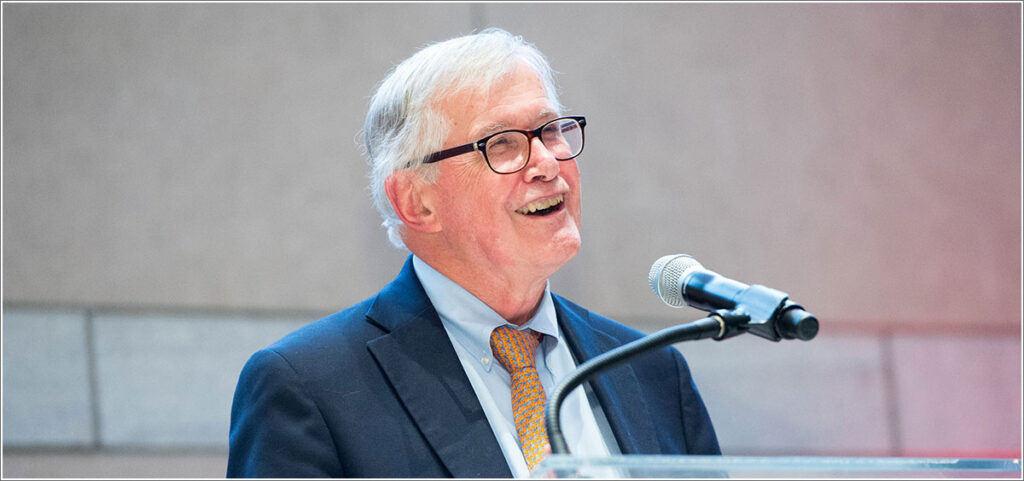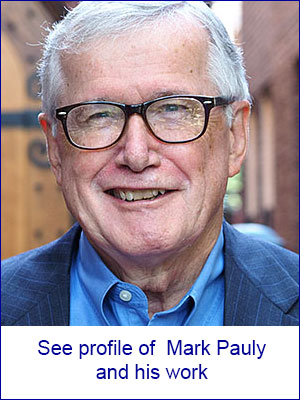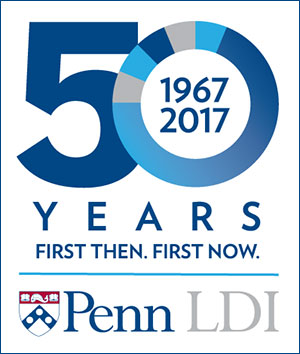News
National Constitution Center Event Honors Health Economist Mark Pauly
LDI 50th Anniversary Tribute to Penn's Renowned Wharton School Professor
More than 300 academics, government and industry officials packed the grand Hall of Flags in Philadelphia’s National Constitution Center for a ceremony paying tribute to University of Pennsylvania Wharton School professor Mark Pauly for his half-century of work as one of the country’s most renowned health economists. The crowd included nearly four dozen of his past and present PhD students.
The Oct. 5 event was part of the two-day 50th Anniversary Symposium of Penn’s Leonard Davis Institute of Health Economics (LDI) of which Pauly is a former Executive Director and a long-time Senior Fellow.
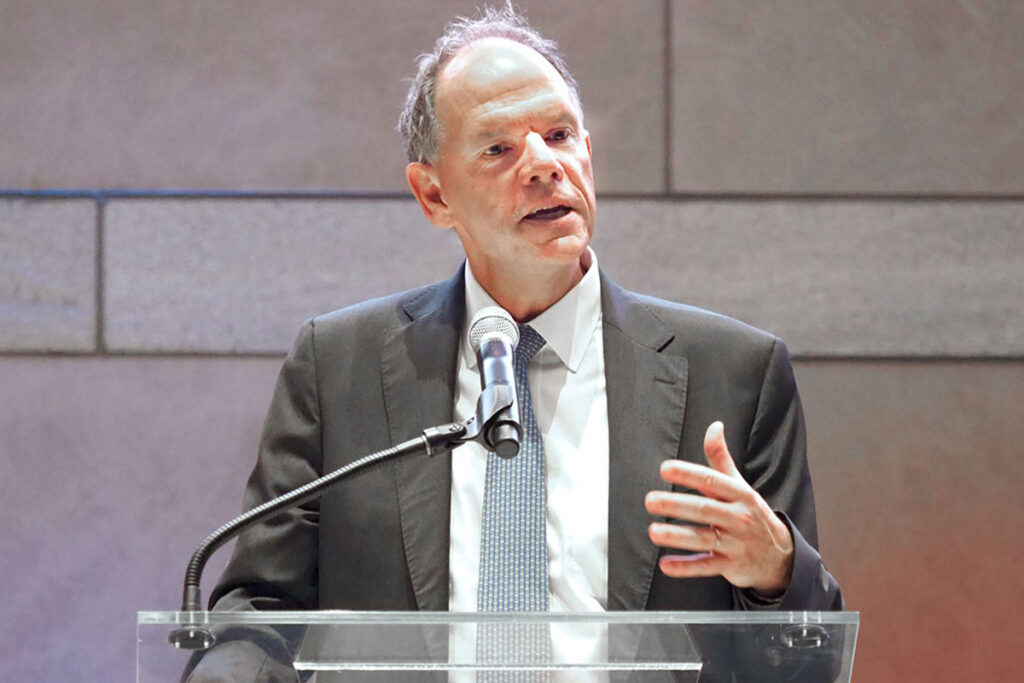
Wharton School Dean Geoffrey Garrett spoke of the “extraordinary role” Mark Pauly has played in health economics.
“We are here,” Wharton School Dean Geoffrey Garrett told the audience, “to celebrate the incredible achievements of LDI over the last 50 years and the extraordinary role that the living legend Mark Pauly has played in that world of health economics.”
Thought leader
Pauly, PhD, is Bendheim Professor in Wharton’s Department of Health Care Management as well as Professor of Economics in Penn’s School of Arts and Sciences. Graduated into a 1960s world that had just witnessed the launch of the Medicare and Medicaid programs that would dramatically transform the country’s health care financing practices, Pauly became a thought leader in the study of the underlying principles and concepts of what was then the new field of “health economics.”
“In an amazing cohort of pioneering health economists” said University of Minnesota Health Policy Professor Bryan Dowd on a video played at the event, “Mark remains for me the clearest thinker, the most lucid writer, the most influential policy analyst and the kindest person that I’ve encountered.”
Over the course of his career at Northwestern University and, since 1983, at Penn, Pauly has also become famed as one of the field’s most eminent teachers.
‘Brutally honest’
In another video tribute, Yale University School of Public Health Professor Amy Justice said “I had the intellectual challenge and personal pleasure of being under Mark Pauly’s guidance as a doctoral student in Health Care Systems at Wharton. He is a shining example of what is right about academics: he’s brutally honest with himself, making him remarkably humble despite his accomplishments. He believes in truth not political correctness, party affiliation or popular thought. And he understands what it is to be human and frequently invited our group of doctoral students to his home for dinner.”
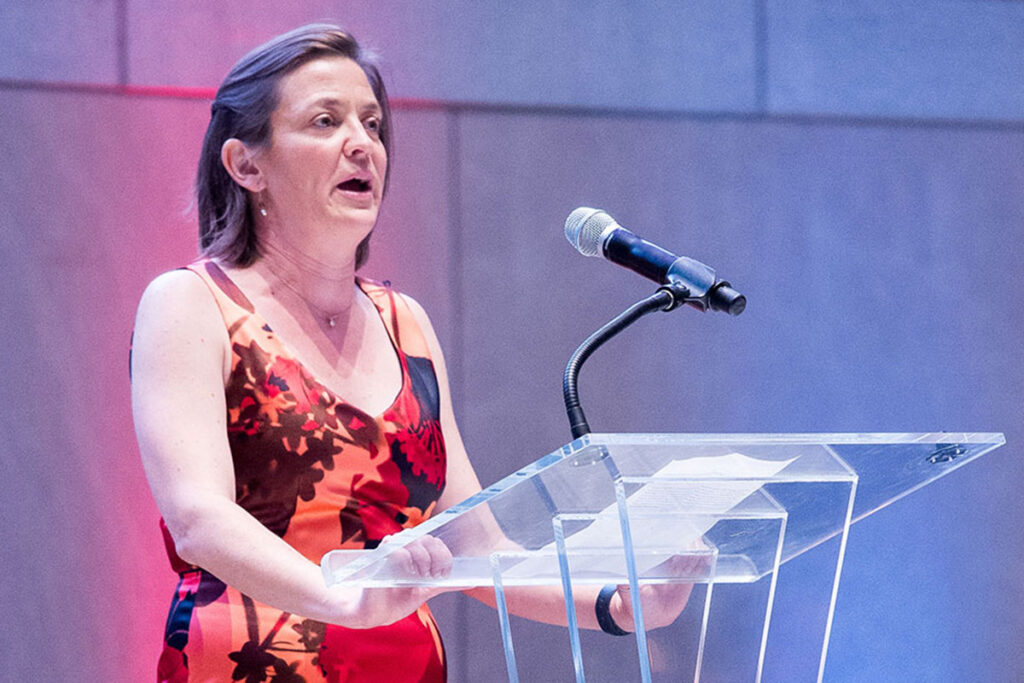
Former Pauly PhD student Stacey McMorrow, now a Senior Research Associate at the Urban Institute, praised Pauly for his mentoring methods and results.
Speaking from the podium, another of his former PhD students, Stacey McMorrow, a Senior Research Associate at the Urban Institute, noted, “Mark takes his mentorships very seriously and is fully invested in each student from the day they enter the program,” she said. “And unlike so many other graduate school horror stories I’ve heard over the years, Mark manages to challenge and motivate students to succeed without pushing them toward research careers that don’t match their preferences. The diversity of positions held by graduates of our program throughout academia, think tanks, government and industry are a testament to the respect Mark has for his students and his commitment to helping them achieve their own optimal outcomes.”
Another speaker and former Pauly PhD student, Rachel Werner, MD, PhD, concurred. “What I loved most about Mark’s mentorship was that he was always willing to think about new ideas that are not at the center of what he studies. He does his best to teach students how to think critically about problems and lets them go out and do what they want to do and be what they want to be.”
Different mentoring method
Werner, a professor and Director of Health Policy and Outcomes Research at Penn Medicine, said, “there are a lot of mentors who are wonderful mentors but who do things in a way that amounts to cloning. It’s easy to take students into your lab or research work and have them answer the questions as you would by using the methods that you would. It’s really much more challenging to do what Mark does as he prepares scholars to become their own researchers in their own independent way.”
Pointing out the important results of that method was Kevin Volpp who spoke both at the podium and in a video tribute. He’s a professor at Penn Medicine and the Wharton School as well as Vice Chairman for Health Policy for the Department of Medical Ethics and Policy, and Director of the LDI Center for Health Incentives and Behavioral Economics.
“Mark Pauly had an enormous impact on my career,” he said. “Without his influence, I don’t know if I would have become a successful academic.”
As she introduced the night’s honored guest on the podium, Stacey McMorrow also struggled to pull a large framed object out of a bulky cardboard package.
Charting the ‘academic descendants’
“Despite our best efforts here tonight,” she told the audience, “it’s hard to really describe in words the influence Mark has had on the field. So, like good economists, we made a chart instead.”
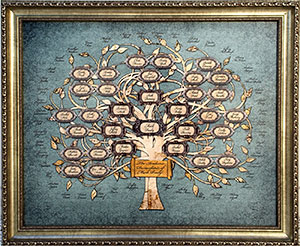
Pauly was presented with this ornate tree chart of his “academic descendants.” Click image for larger.
Commissioned by LDI for the occasion, Colorado artist Virginia Angus, who specializes in designing ornately detailed family tree charts, created a tree of Mark Pauly’s academic “descendants” — the PhDs and those PhD’s own students who have gone on their own scientific careers and accomplishments across the country.
“This mentorship tree,” said McMorrow, “depicts Mark’s legacy through the students who radiate out from him. This is necessarily incomplete because he is still teaching into the future. We are all incredibly proud to be on this tree.”
To a thunderous applause the notoriously witty Pauly accepted the framed tribute and took the podium. He opened his remarks with a public service announcement and a commercial. The public service announcement was “I’m not retiring,” aimed at tamping down any confusion about this event being the end of a career rather than the vigorous continuation of one grandly acknowledged. The commercial was about the January publication of his latest book (he has authored, co-authored or edited 20 others). This new one, titled “Managing Discovery in the Life Sciences,” is co-authored with Wharton Professor Lawton Burns, PhD, MBA and Penn School of Arts & Sciences Professor Philip Rea, DPhil. It explores the science and management of how biomedical innovations become marketable products.
Crucial LDI role
He went to speak briefly about the not-always-obvious but crucial role of LDI as a convener of disparate scholarly disciplines. “It’s like an academic dating service,” he said. “LDI not only brings researchers together but says it’s OK to make connections this way and that is the genius of LDI as well as Penn.”
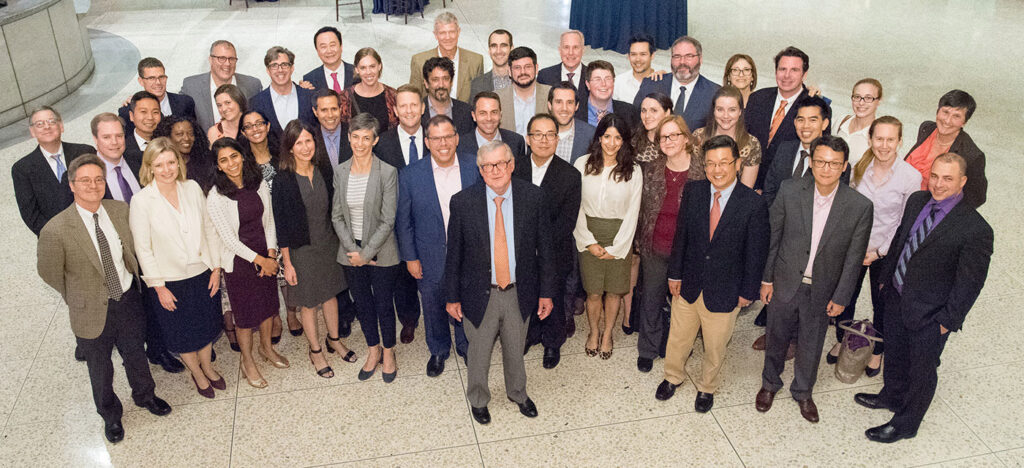
Mark Pauly and 43 of his current and former PhD students gathered for a group photo at the tribute. Click for larger with names.
Not obvious to the outside world is the fact that in many universities there is a tightly siloed environment with department traditions that demand individual scholars to keep their work — and grant funding — exclusively inside that unit’s walls. This prevents the sort of multi-disciplinary research approach that has become ever more important to the process of understanding and effectively analyzing an ever-more complex world.
Fifty years ago, LDI was specifically founded to take a new approach and create a central campus hub of interaction that could bring together disparate scholarly disciplines in a way that would greatly enrich research in the field of health services delivery and financing.
“When I first came here in 1983 and became executive director,” said Pauly, “I made the rounds of various stakeholders and met with John Eisenberg over in General Internal Medicine. He told me, ‘let’s agree that no matter what happens, we won’t care which business administrator administers whatever money there is between LDI and Internal Medicine.’ That concept turned out to be very true and very different. In other places you had deans and department chairs on your back for cooperating like that. Here at Penn, the deans and department chairs were actually cheering us on for working together. That is one of the things that has made this such a fulfilling experience for me and one of the reasons LDI has been so successful.”
Creating PhD program
In closing, Pauly spoke of the irony that when then-LDI Executive Director William Pierskalla first suggested that there needed to be a PhD program in the newly formed Wharton Department of Health Care Management, Pauly didn’t think it would work.
“I was skeptical,” he said. “but amazingly after a few tough years getting it off the ground, we had more and more young people who wanted to do this and it was probably the greatest experience of my life watching as that happened.”
Pauly noted that despite all the praise about his PhD mentoring methods, “I never really thought too much about what I was doing. My philosophy with my own children was ‘each of you is best at something and we just have to figure out what that is. And that became my philosophy with PhD students: ‘Come and tell me your idea and we just have to figure out how to make that a great idea’.”
“Fortunately,” he continued, “the raw material we had to work with was so great, we just pointed them in the right direction and the esprit de corps among the PhD students has been so wonderful over the years that I see it as one of our most valuable assets. I’ve certainly gotten a lot of satisfaction, pleasure, joy and personal growth from interacting with the PhD program and I’m eternally grateful for that.”
